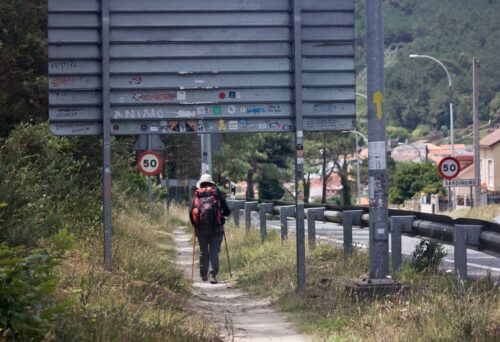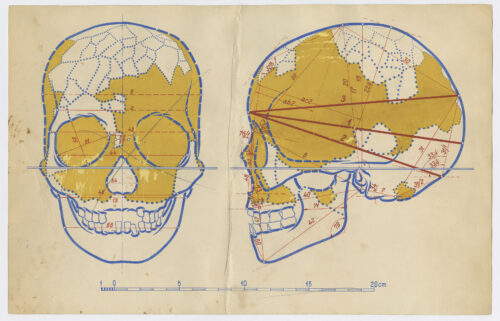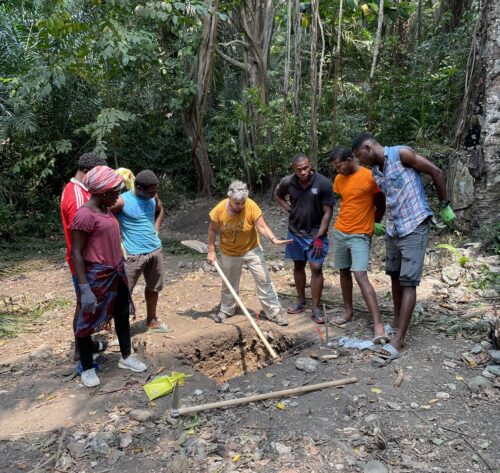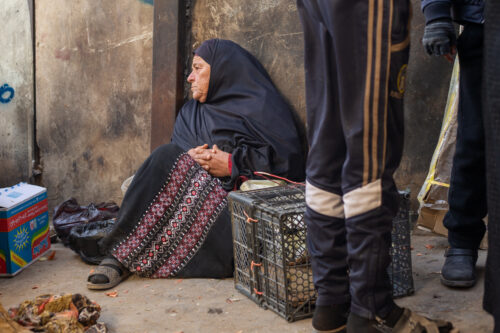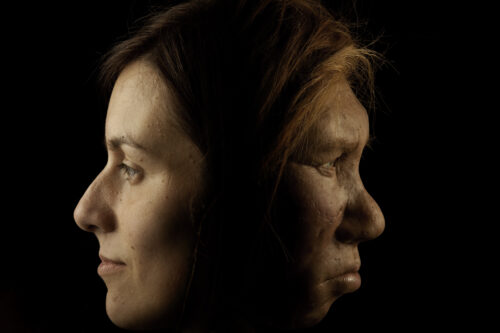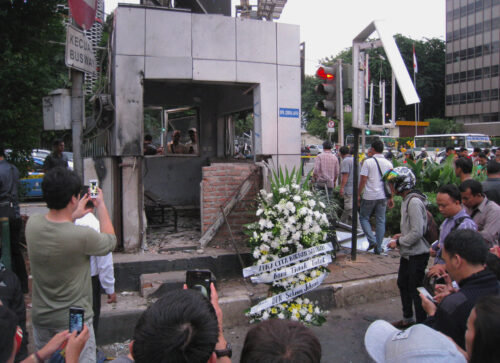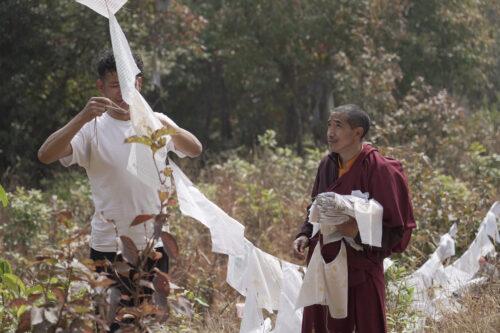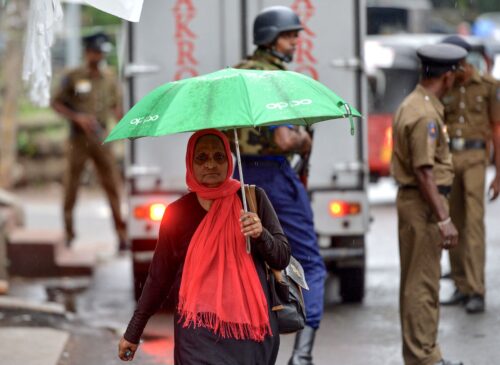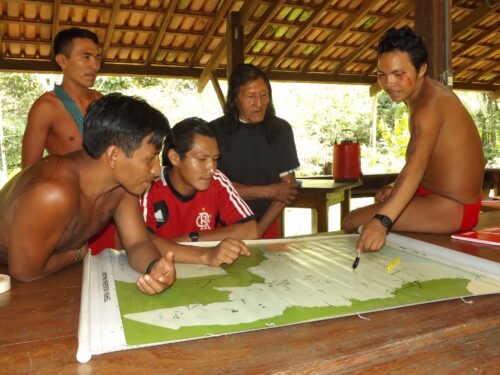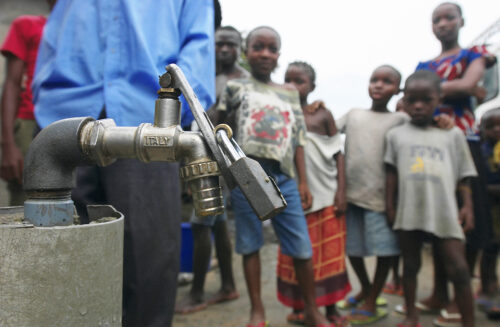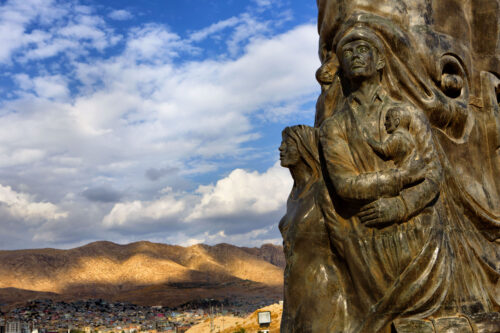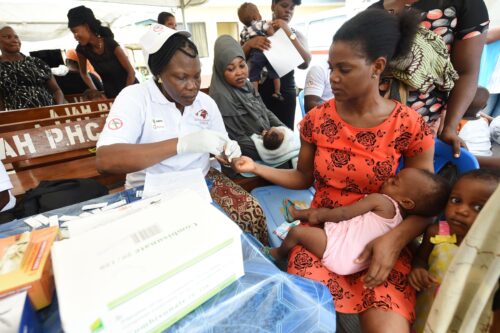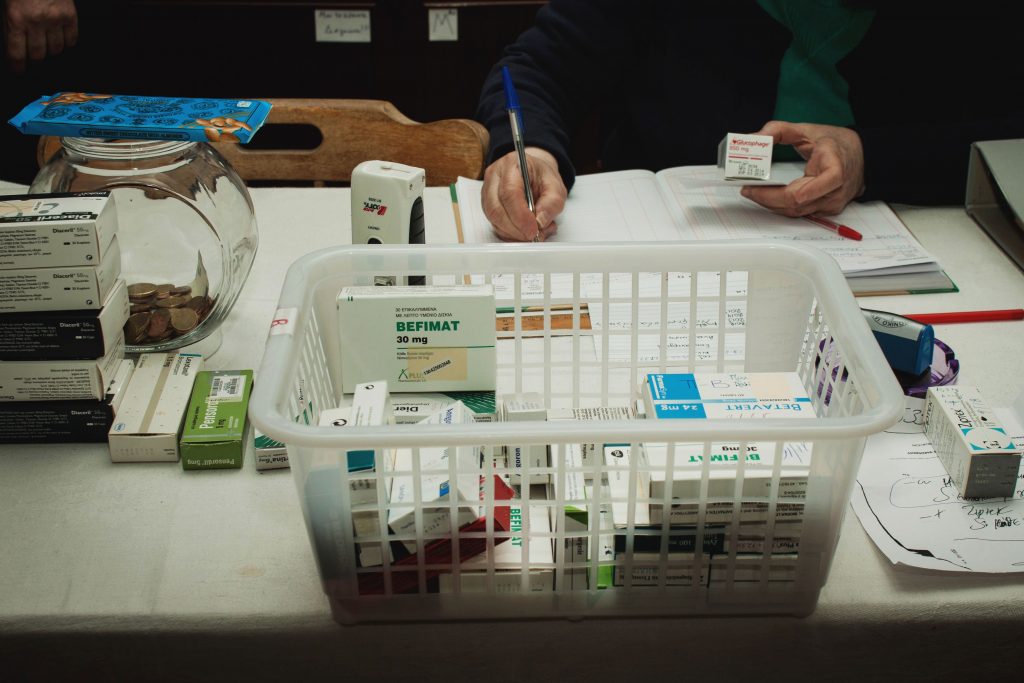Camaraderie in the Face of Greek Austerity
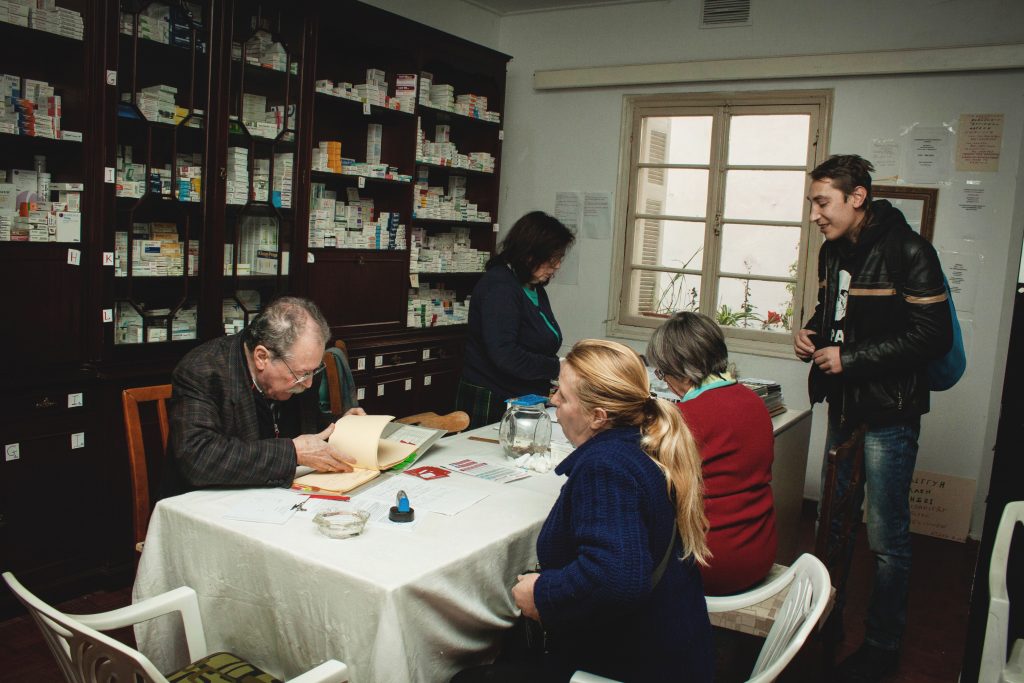
On a hot day in early July, a community-based “social solidarity” pharmacy in Vyronas, an independent municipality on the outskirts of Athens, Greece, bustles with activity as volunteers check and relabel medicines. Uninsured patients—casualties of a health care system struggling under austerity measures, drastic cuts aimed at reducing the budget deficit—come here for their medications, which they receive free of charge. The converted first-floor apartment resembles a pharmacy from another era. The space is dimly lit and cozy, with large wooden shelves where medications are neatly arranged. Until recently, the pharmacy functioned without electricity, making for particularly cold winters, but these days each volunteer who has a job or pension contributes 5 euros (about US$6) a month, which covers the electricity bill, rent, and basic expenses.
A tall, white-haired man arrives wearing the black armband of mourning. His mother recently died, and he has brought unused—and now unneeded—medicines and supplies. I and other volunteers help the man carry large garbage bags from his car to the cool kitchen in the back of the pharmacy. On a long table, medicines are spread out, ready to be checked and organized; metal shelving units along the walls are lined with more medications stored in colorful shoeboxes from a neighborhood shoe store.
Dimitris, a 79-year-old pensioner who founded this pharmacy in 2012 with the help of a group of friends and neighbors, shakes the man’s hand and asks a volunteer to bring him a glass of water. Meanwhile, I assist Soula, another volunteer, as she unpacks the bags. We find medicines in their original boxes and unused syringes organized and grouped together. Even the bedpan (which we later dispose of for sanitary reasons) has been cleaned and wrapped in a plastic bag. The items are a testament to one family’s suffering—and they have been carefully, even lovingly, readied for another in need.
Since early 2015, I have conducted anthropological research on social solidarity clinics and pharmacies—social support networks comprised entirely of volunteers—examining how Greek society is coping with the recent debt crisis and resulting austerity measures. The Social Medical and Pharmaceutical Center of Vyronas, where I am active as both a researcher and a volunteer, is one of more than 50 such initiatives operating in Greece. All of them run on voluntary contributions of labor and medicines and most avoid—if not reject altogether—monetary donations. The pharmacy in Vyronas, for instance, does not even have a bank account. Private pharmacists pass on unneeded medicines that they collect from customers; schools organize pharmaceutical drives; families bring unused items from their medicine cabinets. Citizens’ groups and individuals in other parts of Europe, as well as Greeks in the diaspora, also provide significant support by collecting and sending medicines or even bringing them in person.
Volunteers include working professionals, the unemployed, and a great many pensioners, like Dimitris and Soula, both of whom work at the pharmacy every weekday and often after closing time. Some social clinics provide appointments in-house with general practitioners, specialists, and mental health workers, all of whom are volunteers. The pharmacy in Vyronas collaborates with 104 doctors and 4 diagnostic centers that offer services at no cost.
Greece is reeling—not only from the debt crisis but also from top-down austerity measures imposed by the so-called troika (the European Commission, the European Central Bank, and the International Monetary Fund). Even though Greece is a sovereign nation-state, it has had to comply with austerity measures and show progress toward stabilizing its debts in order to retain its place in the eurozone (the common European currency system). Austerity policies have targeted the Greek social-service system, demanding that Greeks pay the debt with not just their economic well-being but also, in many cases, their physical health. However, some would argue that Greece’s debt can never be repaid.
European Union statistical sources, based on data from the Greek statistical authority, currently estimate Greek unemployment to be about 23 percent (the highest in the EU), though many of my research participants have told me that the real numbers are, in fact, much higher. As a result of austerity, pensions have been cut by 30 to 50 percent, and taxes on necessities have increased dramatically. Austerity has also led to enormous shortages in medical personnel, supplies, and medicines. Meanwhile, incidences of HIV/AIDS, malaria, and tuberculosis are on the rise, and people increasingly lack the means—and the medicines—to treat cancers, diabetes, high blood pressure, and psychological conditions.
I first began doing research in Greece in 2004 for my book on refugees. At that time, Greece was going through an economic boom following its recent accession to the euro and the 2004 Olympic Games (both of which, many would argue, later contributed to its enormous debt). Since 2010, however, I have witnessed the onset of the debt crisis and austerity measures, and met Greek citizens and long-term residents facing overwhelming poverty. Now, in the midst of a refugee crisis in Greece that has reached unprecedented intensity, many Greeks tell me that, with austerity, they themselves have become “internal refugees.”
Solidarity emphasizes shared predicaments and common struggles.
In Greek, allileggii (solidarity) means being close to or near the other. Social solidarity clinics and pharmacies are just one among many types of grassroots distribution networks—such as soup kitchens, grocery outlets, time banks, and even continuing education—that have emerged in austerity-afflicted Greece. Solidarity emphasizes shared predicaments and common struggles. As one volunteer put it, “Today I am lucky, but tomorrow I may be in the other’s place.”
Solidarity structures explicitly operate outside of state, nongovernmental, and corporate entities. But they do not simply aim to “fill gaps” in official social support systems—they also challenge these systems to respond to ever-growing forms of social suffering. One volunteer told me: “We do for free what the state and NGOs are paid to do.” Dimitris vehemently emphasized that their work is not charity or philanthropy. A volunteer at another social clinic explained to me that charity increases the status of the giver while diminishing the receiver; solidarity structures seek to close this gap through non-hierarchical practices emphasizing equality and dignity.
The solidarity movement in Greece exemplifies what some have described to me as the “other face of crisis”: the extraordinary ways in which residents of Greece have mobilized during one of the most desperate periods of the country’s recent history. Yet, most volunteers would agree that their efforts, while laudable, are not enough; they are a bandage—a patch—not a permanent solution. Soula reminds me that she does this work because she must—that she, and volunteers like her, seek to provide what is, in fact, a state responsibility and human right: health care and medicines for all.
The social pharmacy in Vyronas is smaller and more ramshackle than the other solidarity clinics and pharmacies that I have visited. Yet the tightly knit group of 28 volunteers who keep the place going serve as many as 35 patients a day. They are open even during holiday seasons when many private pharmacies and other solidarity clinics are closed. All decisions are made through collective meetings of the volunteers, some of whom also receive medicines at the social pharmacy.
The oldest social clinics, one of which was created on the island of Crete in 2008, and another that was founded in the city of Thessaloniki in 2011, initially focused on assisting migrants who had no immigration papers. However, as needs multiplied and word spread, more and more Greek citizens began visiting these alternative health care venues. These days, most solidarity clinics and pharmacies assist diverse groups of Greeks, long-term migrants, and even newly arrived refugees. In 2015, for instance, solidarity initiatives provided crucial help to many of the more than 800,000 refugees and migrants who arrived in Greece.
“Without the social pharmacy, I would die.”
Social clinics and pharmacies have made an enormous difference in people’s daily lives. As Maria, a former housecleaner who is now unable to work due to arthritis and high blood pressure, put it, “Without the social pharmacy, I would die.” Giorgos, a 75-year-old former housepainter who is chronically ill with respiratory problems—that he is certain were caused by his former occupation—receives almost all of his medicines from the Vyronas social pharmacy.
Through solidarity, residents of Greece have tapped unused sources of labor and goods and revitalized important values in their responses to crisis and austerity. Still, volunteers rarely forget the cruel necessity of their predicaments. While she finds enjoyment in the work—even in organizing medicines into shoeboxes—Soula longs for the day when they will close the pharmacy because it is no longer needed.
The current government, which is led by Syriza, a leftist party that ran on an anti-austerity platform and won by a landslide in 2015, has been widely criticized for its failure to make good on its promises. Largely in response to the advocacy work of the social solidarity clinics and pharmacies, it has recently initiated important policy changes to address gaps in the health care system. It is still too early to know what effects these measures will have.
As Dimitris offers a heartfelt thanks and goodbye to the man who lost his mother, I quietly chat with my fellow volunteers as we continue sorting the medicines. I note to Soula that the large number of contributions might signal an ever-growing spirit of solidarity.
“Maybe,” she agrees, but she also reminds me that, with the crisis, more and more people are dying.
